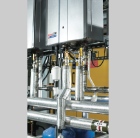Rinnai performs at Loughborough Uni

The first stage of refurbishing domestic-hot-water systems in student accommodation at Loughborough University has seen the installation of three Rinnai condensing water heaters with a small amount of storage to cope with spikes at times of peak demand. They were installed in two blocks of Cayley Hall, which comprises 17 blocks of different sizes. The previous system was described as ‘guzzling energy’.
Jeremy Plant, assistant mechanical-services engineer for facilities-management projects at the university, explains that because demand tends to peak in the morning before college it did not make sense to waste energy keeping large tanks of hot water up to temperature during slack times.
In contrast, the Rinnai storage system is based on a buffer tank with a capacity of 15% of the peak-hour load — or 500 l for this project.
The three HDC1500i water heaters supply hot water on demand to nine showers, 33 wash hand basins and six kitchen sinks. The system also supplies a further 12 separate flats — each with a kitchen sink, shower and wash hand basin.
The Infinity storage system was delivered to site, complete and to a tight timescale for installation by Croft Mechanical Services.








